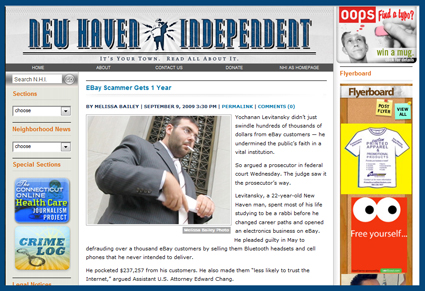U.S. District Judge Peter C. Dorsey today sentenced a Connecticut man, who plead guilty to committing fraud on eBay, to one year and one day in prison. He also ordered that he pay over a quarter of a million dollars in restitution, perform 150 hours of community service, and have three years of supervised release, following the completion of his prison term. Defendant Yochanan Levitansky defrauded eBay customers of hundreds of thousands of dollars.
Levitansky sold consumer electronics on eBay and failed to deliver the products to the buyers, defrauding customers of $237,257.
Edward Chang, Assistant U.S. Attorney, argued that this made those defrauded “less likely to trust the Internet”. The Judge believe that restitution was insufficient punishment and sentenced Levitansky to the prison term, supervised release, community service, and ordered him to repay the $237,257 to eBay.
Public defender, Sarah A. L. Merriam, argued in her sentencing memo that Levitansky did not originally intend to scam eBay members, but that his business “quickly got out of hand” and that Levitansky “became completely overwhelmed”. She argued that eBay’s insurance policies softened the impact of the fraud and that he knew if he failed to perform, eBay would refund the customers.
Levitansky had no prior criminal record.
Melissa Bailey of the New Haven Independent has published a detailed article on this story on their website, NewHavenIndependent.org: eBay Scammer Gets 1 Year
While this case may be different in the nature of the crime, specific to the actual fraud (non-delivery of merchandise), it is in my opinion very relevant to the hobby of collecting original film and television memorabilia, in that eBay is used as the platform with which to take advantage of consumers through deceit.
As we have witnessed, many collectors are defrauded by individuals and dealers selling large quantity of “fake” TV and movie props and costumes – in many instances, ordinary items sold with claims that they were used in entertainment productions or owned by actors, Hollywood celebrities, and other public figures. Depending on one’s perspective, the fraud we witness in the entertainment memorabilia realm is actually far worse, in that those victims may not realize that they’ve been defrauded, whereas in this case, buyers who do not receive the merchandise that they’ve paid for know to pursue recourse, alert eBay, and make reports to the relevant law enforcement agencies. In many cases, the fake entertainment memorabilia sold for hundreds and thousands of dollars truly have little to no actual value.
Given the Assistant U.S. Attorney’s perspective articulated in the Levitansky case, per the New Haven Independent Report (see below), the act of manufacturing inauthentic goods and false provenance is arguably a substantially more egregious, amoral, and unscrupulous crime with significant and unfortunate consequences in the marketplace:
As more people turn to the Internet to buy goods, they need to be able to have faith that anonymous sellers won’t rip them off, Chang argued. Though the customers Levitansky swindled have mostly been repaid by eBay, he said, “they will have the memory of being defrauded.”
The scheme not only damaged eBay, he said. It damaged the Internet.
In my own discussions with eBay representatives and various law enforcement agencies, I believe it is only a matter of time until there is a case similar to the one reported in the New Haven Independent story in which a criminal dealing in fraud selling misrepresented items as authentic entertainment memorabilia will be the subject of a law enforcement investigation and subsequent criminal trial in which similar consequences are the result.
Past articles published by the Original Prop Blog related to other legal disputes and court proceedings can be found via the portal below:
Jason DeBord



